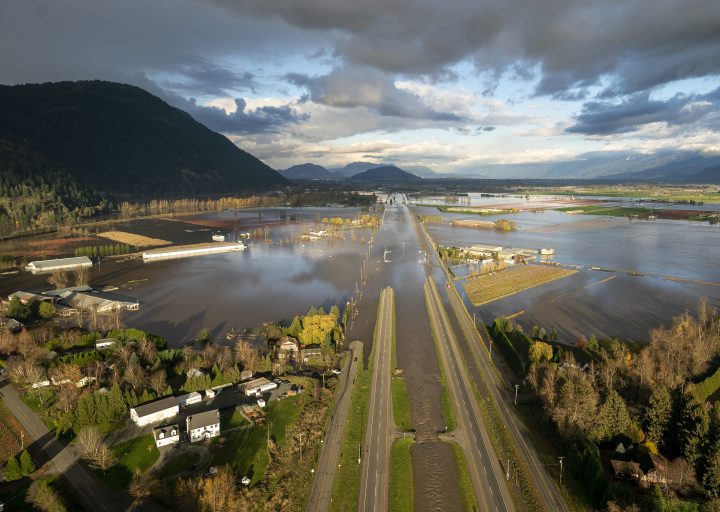As officials in British Columbia assess the damage left behind a massive storm that’s caused devastating flooding and mudslides, the impacts are rippling across the country — including into Manitoba.

All major highways between B.C.’s Lower Mainland and the Interior were severed, some in several locations, when record rainfall washed away bridges and roads over a 24-hour period starting Sunday.
For Niverville’s Chuck Allen, the supply chain disruptions mean his display at a craft show in Calgary is looking a little bare.
The owner of Earth + Hide made it to Calgary Thursday after setting up at a craft show in Vancouver, but his leather goods and pottery are trapped in B.C., unable to get through the washed-out highways.
“There’s a number of makers who are in the same boat as me, who have all of our goods — our entire livelihood — on semi trucks that are stuck in Abbotsford right now,” he told 680 CJOB.
“So we’re just waiting on the roads to be clear or an alternate route or something so that we can get all of our goods and the displays and everything to us here.”
Allen says he’s been able to get posters of his crafts printed and a few samples sent out from Manitoba so the Calgary show won’t be a total loss, but others haven’t been so lucky.
Manitoba Trucking Association executive director Terry Shaw says just one of the association’s more than 300 members has 52 trucks filled with fresh Manitoba pork sitting idle between B.C. and Saskatchewan because of the disruptions.
“Those 52 loads alone are costing them about $1,200 a day, per truck, the value of that pork is almost $4 million,” Shaw said Thursday.

Get daily National news
And finding an alternative route — like heading south through the United States for instance — isn’t as easy as it might sound, Shaw says.

For one thing, Shaw says many Canadian trucking companies aren’t set up to operate in the U.S. — it requires different insurance, credentials and passports — and the U.S. also has different rules, including lower weight allowances for loads, which, in the end, mean higher costs.
For example, Shaw said the 52 loads of Manitoba pork currently stuck in Canada would need to be transferred into 70 separate loads to be allowed on U.S. roadways.
“So it’s not as simple as just kind of hanging a left and going through the States,” he said.
“There’s a lot of logistics involved and a ton of costs.”
And the financial problems caused by the interruptions go both ways.
Shaw says the same trucks that are stuck heading to Vancouver bring goods back to the prairies from ports on the west coast, and the costs of those delays are likely to be passed down.
“Manitoba consumers will see very likely higher costs and delays in goods,” Shaw said.
“The goods are coming (but) they may not be here on demand as Manitobans are used to and at the prices that Manitobans are accustomed to seeing today.”
Shaw couldn’t say what kind of price increases Manitobans will see out of the delays, or how long they’ll last.
But Shaw did say he expects the supply chain issues caused by the storm to continue well into next year.

At a news conference Wednesday, B.C. Premier John Horgan declared a province-wide state of emergency and said his government is working to assess the damage and reopen supply roads as quickly and safely as possible.
David Gillen, the director for the centre for transportation studies at the University of British Columbia, estimates it will take about two weeks for repairs to allow normal traffic flow to resume, but he adds it will be months for a complete recovery because road work is limited during winter months.
“It’s going to take some time until these routes are repaired enough for trucks to travel,” Gillen said.
“But there is some degree of substitutability that there isn’t with railroads because you basically have two main lines and they’re both severely hampered. They have to be rebuilt.”
— with files from Brittany Greenslade and The Canadian Press







Comments